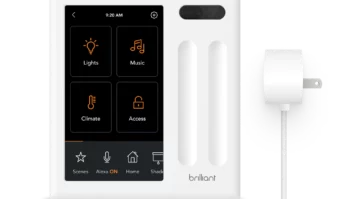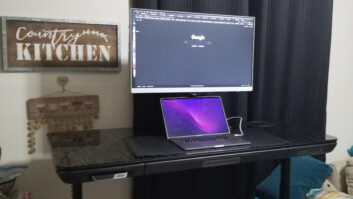While consumer electronics and cable TV industry executives were upbeat on current developments in HDTV, they were also concerned that a possible delay in the Federal Communications Commission’s (FCC) approval of cable-ready HDTVs will push back product introductions beyond the fourth quarter of 2004.
That was one of several areas that executives from Best Buy, Comcast Cable Communications, ESPN, Mitsubishi Electronics and Sony Electronics agreed upon during a breakfast panel discussion presented by TWICE and sister publication Multichannel News during the National Cable Telecommunications Association (NCTA) Show, held at McCormick Place, here.
Dave Sprosty, subscription services VP of Best Buy, David Watson, executive VP/sales, marketing and communications of Comcast, Bryan Burns, strategic business planning and development, ESPN, Bob Perry, marketing VP of Mitsubishi Electronics, and Greg Gudorf, senior VP of Sony Electronics’ Digital Platform Division, were the five panelists.
It was Perry, also chairman of the Consumer Electronics Association’s (CEA) Video Division, who was the first to sound the alarm on the urgency to have the FCC approve the plug-and-play agreement which was reached by the cable and CE industries last December.
“We wanted a decision by [this month] to allow us to effectively produce product by June 2004, but we have no decision yet by the FCC.” He added, “We’ve heard that the decision may be delayed until September. If that happens there will be no product next year. We need a decision by July. We need 12 months to develop product.”
Perry called on the cable industry, “NCTA [and] CEA to urge the FCC to move now.”
When asked about the future of bi-directional HDTV services such as VOD, pay-per-view and others, Perry said, “To develop these new services now, the FCC has to understand that we can’t develop them unless we know what our foundation is, what our basic standard is.”
Aside from the FCC debacle, the tone of the panel discussion was one of understanding the problems and challenges of the other industries involved, a far cry from several years ago. Consumer education, retailer support and the realization that HDTV is being accepted now by the public were all points of agreement for the panel.
Best Buy’s David Sprosty said that HDTVs have sold well without much content, but when cable content is available “our digital cable sales have doubled. It’s like we turned on a switch.” He said that Best Buy’s role in the market is to “educate consumers and make it easier for them to buy it. We focus on different market segments, talk about content and provide service.”
Gudorf of Sony noted that with his company’s experience in satellite, cable TV, Web TV, PVR-based products and others, consumers are “buying content. That’s the business.”
Gudorf added that other technologies have proven that “once programming is established you can provide other features, other services, such as Dolby sound, easier to use guides, etc. Once more consumers buy HDTV they will want more services, some services they didn’t even knew they needed. That is the innovation that the CE business is famous for.”
Before that happens, said Comcast’s Watson, content and cable providers, broadcasters and CE retailers and manufacturers “have to come together to make HDTV a success. The time has come. We want to make up for lost ground we gave to the satellite industry. Products like DVR, VOD and others go after the high-end customer. We lost ground [to the satellite industry] because we didn’t have the right product in place.”
ESPN’s Burns stressed, “The days of little HDTV programming is close to over. By [July 1] ESPN HD will be available in all Best Buy stores. We are spreading the word and we hope to ? motivate and inspire customers.”
Best Buy’s Sprosty noted, “We must provide a common message and ask the same questions [when consumers enter stores]. Then we can show them our cable and DBS options, and let them know about HDTV broadcasts in their area.”
He added, “The advantage of [Best Buy’s] non-commissioned sales force is we can provide an overview of what’s best for the consumer, and not what is the best for the salesperson.”
Comcast’s Watson agreed, noting that his company’s experience with Best Buy during its HDTV rollout in Philadelphia showed that. He added that by the fourth quarter another non-commissioned national chain, Circuit City, and some other unnamed retailers will get the opportunity to sell Comcast’s HDTV cable boxes.
ESPN’s Burns added that local cable providers should realize “there are more stores out there than just Best Buy and Circuit City. There are mom-and-pop stores that they should approach, local retailers.”
Comcast’s Watson said that cable providers “need to move away from the ‘one-size-fits-all’ business model. We should find out if [consumers] are satisfied and then ? accelerate new content options.”













